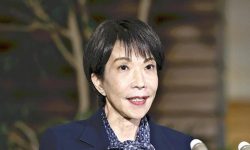
Economy, Trade and Industry Minister Ken Saito, second from right, attends the Japan-EU High-Level Economic Dialogue in Paris on Thursday.
15:52 JST, May 4, 2024
PARIS — Member countries of the Organization for Economic Cooperation and Development agreed to work to build resilient and reliable supply chains to strengthen economic security at the meeting that ended in Paris on Friday.
Japan also agreed with the European Union to begin coordinating policy on strategic goods. In April, Japan and the United States pledged to strengthen cooperation on the same issue.
And amid growing concern about “economic coercion” in which countries pressure trade partners with trade restrictions, OECD ministers will also expedite the creation of transparent international rules between like-minded countries.
“We feel acutely the importance of continuing and advancing industrial policy coordination and rulemaking with countries in North America and Europe, and other like-minded countries,” said Economy, Trade, and Industry Minister Ken Saito at a press conference on Thursday evening, after the fifth Japan-EU High-Level Economic Dialogue and the OECD session on economic security.
At the OECD session, ministers confirmed the importance of cooperation with other countries, including developing countries, based on the principles of trust and transparency so as to build more resilient supply chains.
It was the first time the issue of economic security was taken up for intensive discussion in a full session of the ministerial council.
“Many countries expressed concern about economic coercion,” said Saito. The Ministerial Council Statement called on all countries to refrain from using economic coercion against trade partners.
At the Japan-EU dialogue, both sides agreed to establish a common rule that they would not rely on certain countries to supply strategic goods, such as storage batteries.
Valdis Dombrovskis, executive vice president of the European Commission, the executive body of the EU, stressed that the issue should be addressed not only by Japan and the EU but also in cooperation with other like-minded countries.
As for the United States and Japan, the two agreed to strengthen supply chains for strategic goods at a summit in April.
Since the United States and the EU are also in talks to coordinate their industrial policy, Japan, the United States and the EU have begun to build supply chains that do not rely on countries such as China.
By securing agreements now, Japan intends to “pin down” the direction of policy, as one government source put it, before the United States holds its presidential election in November and the EU holds parliamentary elections in June, so that a change in politics in Washington or Europe will not disrupt international supply chains.
Top Articles in World
-

Israeli Ambassador to Japan Speaks about Japan’s Role in the Reconstruction of Gaza
-

Videos Plagiarized, Reposted with False Subtitles Claiming ‘Ryukyu Belongs to China’; Anti-China False Information Also Posted in Japan
-

North Korea Possibly Launches Ballistic Missile
-

Chinese Embassy in Japan Reiterates Call for Chinese People to Refrain from Traveling to Japan; Call Comes in Wake of ¥400 Mil. Robbery
-

Russia: Visa Required for Visiting Graves in Northern Territories, Lifting of Sanctions Also Necessary
JN ACCESS RANKING
-

Japan PM Takaichi’s Cabinet Resigns en Masse
-

Japan Institute to Use Domestic Commercial Optical Lattice Clock to Set Japan Standard Time
-

Israeli Ambassador to Japan Speaks about Japan’s Role in the Reconstruction of Gaza
-

Man Infected with Measles Reportedly Dined at Restaurant in Tokyo Station
-

Videos Plagiarized, Reposted with False Subtitles Claiming ‘Ryukyu Belongs to China’; Anti-China False Information Also Posted in Japan
























